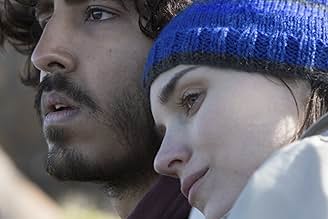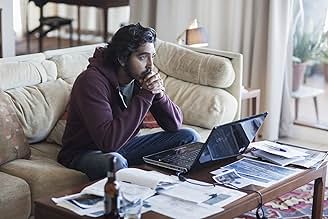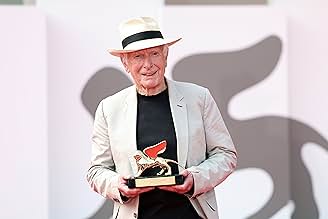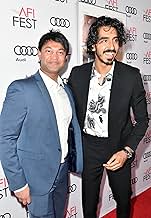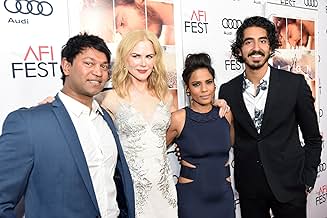Un bambino indiano di cinque anni si perde per le strade di Calcutta, a migliaia di chilometri da casa. Sopravvive a molteplici sfide fino ad essere adottato da una coppia in Australia. 25 a... Leggi tuttoUn bambino indiano di cinque anni si perde per le strade di Calcutta, a migliaia di chilometri da casa. Sopravvive a molteplici sfide fino ad essere adottato da una coppia in Australia. 25 anni dopo, parte alla ricerca della sua famiglia perduta.Un bambino indiano di cinque anni si perde per le strade di Calcutta, a migliaia di chilometri da casa. Sopravvive a molteplici sfide fino ad essere adottato da una coppia in Australia. 25 anni dopo, parte alla ricerca della sua famiglia perduta.
- Candidato a 6 Oscar
- 59 vittorie e 110 candidature totali
- Police Official
- (as Koushik Sen)
- Liluah Teacher
- (as Uday Shankar Paul)
Recensioni in evidenza
A movie with a soul of its own
An immensely satisfying cinematic experience: visually stunning, narratively powerful, and an emotional whirlwind. Best Aussie film of the year.
This true story is told in two parts and filmed across two continents. Five year-old Saroo is a ragamuffin sidekick to his older brother Guddo, two poor boys who support their family by stealing coal and scavenging trains in their West Bengal village. They become separated one night and Saroo finds himself alone on a train heading to the other side of India. He he joins hordes of homeless children who must fend off predators while begging to survive. Eventually he is placed in a crowded orphanage, then adopted by two big-hearted and childless Tasmanians, Sue (Nicole Kidman) and John (David Wenham). Twenty years on, Saroo (Dev Patel) begins to have memory flashbacks of his native land. As they increase in intensity, he becomes obsessed with finding his family. With some luck and Google maps, the story comes full circle.
There is so much that makes this film stand out. The storytelling is more than engaging: it is so captivating that the two-hour run-time feels like an hour. Acting performances are outstanding: Nicole Kidman is at her best while the five year-old Saroo (Sunny Pawar) is the heart of the film and Dev Patel its soul. The cinematography is brilliant, especially the filming in India. The camera-work is both expansive and intimate, shifting often from sweeping aerial panoramas of mountainous Indian countryside and tranquil Tasmanian waterways to narrow winding alleys, village markets, and the inner-world of Saroo's turmoil. Some of the most powerful scenes are shot from the eye-level of a terrified lost boy jostled by masses of humanity and the close-ups of Saroo's painful face desperate to know home. The colour palette is exotic, sound track emotionally intense, and the directing finds a rhythm that is almost orchestral.
This film offers an immensely satisfying cinematic experience: visually stunning, narratively powerful, and an emotional whirlwind. It comes at the end of a very mixed year for Australian film, with some of the world's finest produced but many that are less than inspiring. Lion is one of those films that will appeal to everyone and it has a very long after-taste. It easily tops my film year.
Powerful story, will move you to tears. Be sure to bring plenty of Kleenex.
This happens there everyday..and most children never find their way back. They either end up dead or in the hands of heartless people who use children for various illegal / unethical operations. The fact that one boy survived this situation and went on to tell his story is very inspiring and this fantastic film did justice to showing it on screen.
There wasn't a single scene in the movie which doesn't suck you in. Hats off to Dev Patel. He managed to make you feel the character's pain just by the way he looked at a jalebi (indian sweet that his brother and him fantasized about back in India). Special shoutout to the young actor who played little Saroo. His performance blew me away. It would be difficult to watch any child go through what he did and the fact that he was absolutely adorable looking made it even harder.
The movie explores some great themes: What happens to lost children in developing countries? How do poor, illiterate citizens of a country go about finding their lost children...who helps them? What are the dangers faced by these lost children? Why do certain people choose to adopt? How do adopted children adapt to their surroundings? Especially when they're transplanted so many miles away from home where they do not even speak the language. Do children every fully recover from traumatic childhood experiences? Does one forget their original family if they never see them again after the age of 5? As an adopted child do you ever completely feel like you fit into your new life? What is the bond with your adoptive parents like? The film touches upon all these themes while primarily being about the physical and emotional journey of a young man finding his way back home with very few clues to work with.
I kid you not, I could hear the whole theatre crying during several parts of the movie and most people had tissues in their hands. So be prepared. If you're in the mood for a heart wrenching drama with an uplifting ending, go watch this one once its out! The lead cast as well as supporting members have all done a wonderful job. You will not be disappointed!
Truly Exceptional
By now you probably know the synopsis, so I'll add for those who haven't seen the film that it's visually stunning, the acting is superb (special mention to phenomenal newcomer Sunny Pawar, who plays 5 year old Saroo) and the story is so gripping and moving, that there wasn't a dry eye in the house when the film reached it's emotional climax.
I've been thinking about this film since I saw it, there's drama, mystery, romance, a whirlwind of emotions throughout the 2 hours - in the best way possible.
Couldn't stop crying
A young Indian boy leaves their village with his older brother to do some "jobs", in one of these jobs he gets lost and cannot find his way back home. Pass some years and he's adopted by a family from Australia, and when that boy becomes an adult, he starts wondering where he's actually from.
It deals with aspects of origin and identity, and that we cannot escape from who we really are.
Superb, superb acting from everyone, from the little Indian boys, specially Sunny Pawar that plays the young Sarro, to Dev Patel who has clearly matured into a top class act and is endearing and touching playing the older Saroo.
I'm certainly watching it again.
Lo sapevi?
- QuizTo internalize her character, Priyanka Bose went to Madhya Pradesh to meet Kamla Munshi, the mother her character was based on: "My questions were basic and just by meeting her, I could tell how hard her life has been. I got down on my knees and hugged her and thanked her for her courage." When meeting Munshi she was told that she was declared crazy by many villagers in the small town for years, as she never gave up hope that her son would return one day.
- BlooperAt 1:06:21, Saroo is seen using Samsung Galaxy S in 2008, but the model was released in 2010.
- Citazioni
Saroo Brierley: I'm sorry you couldn't have your own kids.
Sue Brierley: What are you saying?
Saroo Brierley: We... we... weren't blank pages, were we? Like your own would have been. You weren't just adopting us but our past as well. I feel like we're killing you.
Sue Brierley: I could have had kids.
Saroo Brierley: What?
Sue Brierley: We chose not to have kids. We wanted the two of you. That's what we wanted. We wanted the two of you in our lives.That's what we chose.
[pause]
Sue Brierley: That's one of the reasons I fell in love with your dad.
[pause]
Sue Brierley: Because we both felt as if... the world has enough people in it. Have a child, couldn't guarantee it will make anything better. But to take a child that's suffering like you boys were. Give you a chance in the world. That's something.
- Curiosità sui creditiAfter the final credits, there's an earlier shot with the boys on the train tunnel and the credits "In loving memory of Guddu".
- Versioni alternativeThe Extended Australian Edition runs approx. 12 minutes longer.
- Colonne sonoreAaja Nindiya Aaja Nainan Beech Sama Ja
Written by Khayyam
(Saregama India/Mushroom Music)
Performed by Lata Mangeshkar
Licensed courtesy of Saregama India
I più visti
- How long is Lion?Powered by Alexa
Dettagli
- Data di uscita
- Paesi di origine
- Siti ufficiali
- Lingue
- Celebre anche come
- Un camino a casa
- Luoghi delle riprese
- Ganesh Talai, Khandwa, Madhya Pradesh, India(The home of the Saroo)
- Aziende produttrici
- Vedi altri crediti dell’azienda su IMDbPro
Botteghino
- Budget
- 12.000.000 USD (previsto)
- Lordo Stati Uniti e Canada
- 51.738.905 USD
- Fine settimana di apertura Stati Uniti e Canada
- 123.360 USD
- 27 nov 2016
- Lordo in tutto il mondo
- 140.853.810 USD
- Tempo di esecuzione
- 1h 58min(118 min)
- Colore
- Mix di suoni
- Proporzioni
- 2.39 : 1







